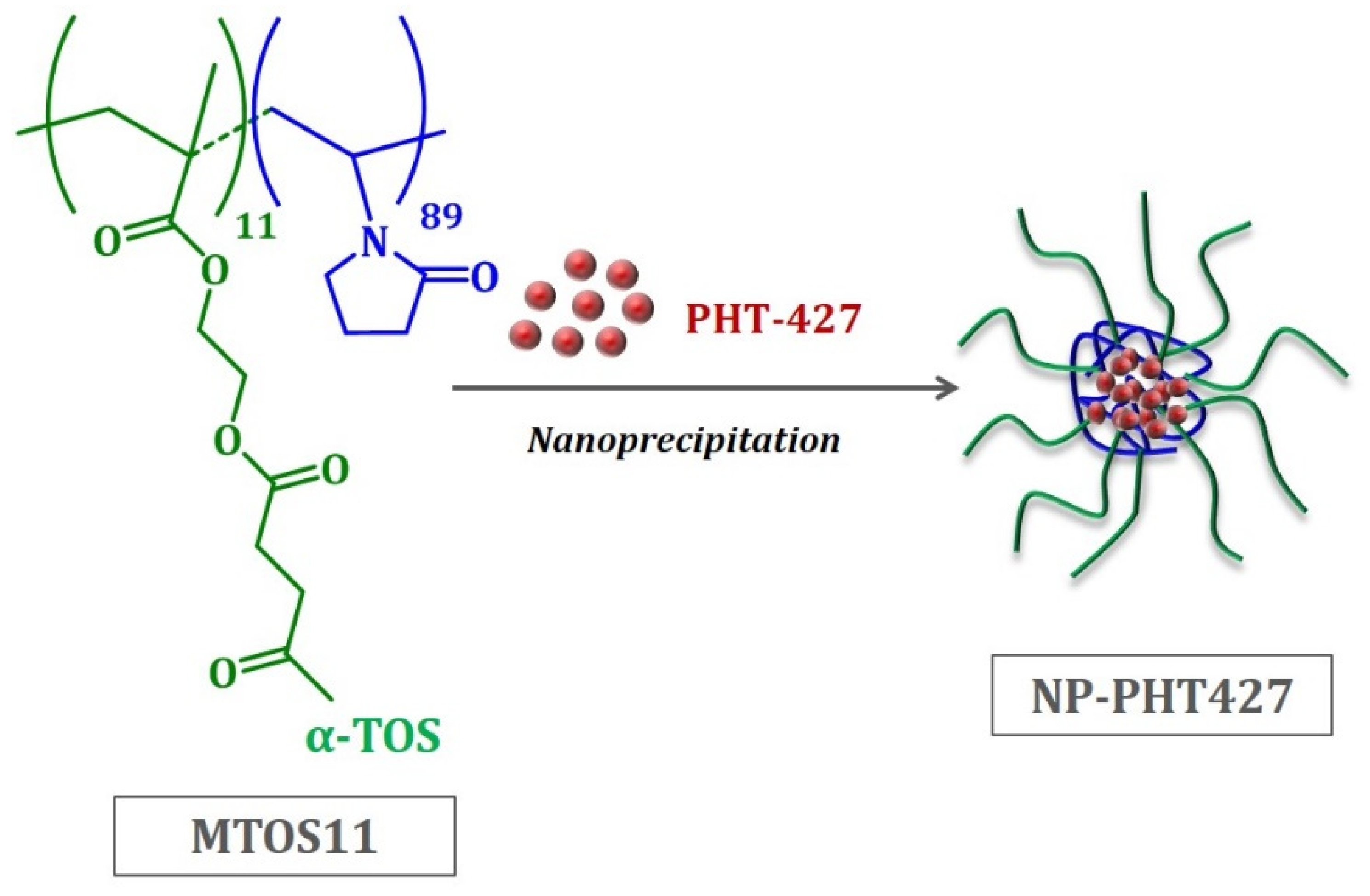Currently, new treatments are required to supplement the current standard of care for head and neck squamous cell carcinoma (HNSCC). The phosphatidylinositol3-kinase (PI3K) signaling pathway is commonly altered and activated in HNSCC. PHT-427 is a dual PI3K-mammalian target of the AKT/PDK1 inhibitor; however, to the best of our knowledge, the effect of the PHT-427 inhibitor on HNSCC has not been investigated. This study aims to evaluate the antitumoral effect of PHT-427-loaded polymeric nanoparticles based on α-tocopheryl succinate (α-TOS). The in vitro activity of PHT-427 was tested in hypopharynx carcinoma squamous cells (FaDu) to measure the cell viability, PI3KCA/AKT/PDK1 gene expression, and PI3KCA/AKT/PDK1 levels. Apoptosis, epidermal growth factor receptor (EGFR), and reactive oxygen species (ROS) were also measured. The presence of PHT-427 significantly enhances its antiproliferative and proapoptotic activity by inactivating the PI3K/AKT/PDK1 pathway. Nanoparticles (NPs) effectively suppress AKT/PDK1 expression. Additionally, NPs loaded with PHT-427 produce high oxidative stress levels that induce apoptosis. In conclusion, these results are promising in the use of this nanoformulation as a PHT-427 delivery system for effective HNSCC treatment.
3729048
{3729048:9UA9U7J5}
nature
50
1
1
title
949
http://www.biomateriales.ictp.csic.es/wp-content/plugins/zotpress/
%7B%22status%22%3A%22success%22%2C%22updateneeded%22%3Afalse%2C%22instance%22%3A%22zotpress-42f1fff7c7d780c1be91c4360f01e5fc%22%2C%22meta%22%3A%7B%22request_last%22%3A0%2C%22request_next%22%3A0%2C%22used_cache%22%3Atrue%7D%2C%22data%22%3A%5B%7B%22key%22%3A%229UA9U7J5%22%2C%22library%22%3A%7B%22id%22%3A3729048%7D%2C%22meta%22%3A%7B%22creatorSummary%22%3A%22Yanes-D%5Cu00edaz%20et%20al.%22%2C%22parsedDate%22%3A%222021-08%22%2C%22numChildren%22%3A2%7D%2C%22bib%22%3A%22%3Cdiv%20class%3D%5C%22csl-bib-body%5C%22%20style%3D%5C%22line-height%3A%202%3B%20%5C%22%3E%5Cn%20%3Cdiv%20class%3D%5C%22csl-entry%5C%22%20style%3D%5C%22clear%3A%20left%3B%20%5C%22%3E%5Cn%20%3Cdiv%20class%3D%5C%22csl-left-margin%5C%22%20style%3D%5C%22float%3A%20left%3B%20padding-right%3A%200.5em%3B%20text-align%3A%20right%3B%20width%3A%201em%3B%5C%22%3E1.%3C%5C%2Fdiv%3E%3Cdiv%20class%3D%5C%22csl-right-inline%5C%22%20style%3D%5C%22margin%3A%200%20.4em%200%201.5em%3B%5C%22%3EYanes-D%5Cu00edaz%2C%20J.%20%3Ci%3Eet%20al.%3C%5C%2Fi%3E%20%3Ca%20target%3D%27_blank%27%20href%3D%27https%3A%5C%2F%5C%2Fwww.mdpi.com%5C%2F1999-4923%5C%2F13%5C%2F8%5C%2F1242%27%3EAntitumor%20Activity%20of%20Nanoparticles%20Loaded%20with%20PHT-427%2C%20a%20Novel%20AKT%5C%2FPDK1%20Inhibitor%2C%20for%20the%20Treatment%20of%20Head%20and%20Neck%20Squamous%20Cell%20Carcinoma%3C%5C%2Fa%3E.%20%3Ci%3EPharmaceutics%3C%5C%2Fi%3E%20%3Cb%3E13%3C%5C%2Fb%3E%2C%201242%20%282021%29.%20%3Ca%20title%3D%27Cite%20in%20RIS%20Format%27%20class%3D%27zp-CiteRIS%27%20href%3D%27http%3A%5C%2F%5C%2Fwww.biomateriales.ictp.csic.es%5C%2Fwp-content%5C%2Fplugins%5C%2Fzotpress%5C%2Flib%5C%2Frequest%5C%2Frequest.cite.php%3Fapi_user_id%3D3729048%26amp%3Bitem_key%3D9UA9U7J5%27%3ECite%3C%5C%2Fa%3E%20%3C%5C%2Fdiv%3E%5Cn%20%3C%5C%2Fdiv%3E%5Cn%3C%5C%2Fdiv%3E%22%2C%22data%22%3A%7B%22itemType%22%3A%22journalArticle%22%2C%22title%22%3A%22Antitumor%20Activity%20of%20Nanoparticles%20Loaded%20with%20PHT-427%2C%20a%20Novel%20AKT%5C%2FPDK1%20Inhibitor%2C%20for%20the%20Treatment%20of%20Head%20and%20Neck%20Squamous%20Cell%20Carcinoma%22%2C%22creators%22%3A%5B%7B%22creatorType%22%3A%22author%22%2C%22firstName%22%3A%22Joaqu%5Cu00edn%22%2C%22lastName%22%3A%22Yanes-D%5Cu00edaz%22%7D%2C%7B%22creatorType%22%3A%22author%22%2C%22firstName%22%3A%22Raquel%22%2C%22lastName%22%3A%22Palao-Suay%22%7D%2C%7B%22creatorType%22%3A%22author%22%2C%22firstName%22%3A%22Mar%5Cu00eda%20Rosa%22%2C%22lastName%22%3A%22Aguilar%22%7D%2C%7B%22creatorType%22%3A%22author%22%2C%22firstName%22%3A%22Juan%20Ignacio%22%2C%22lastName%22%3A%22Riestra-Ayora%22%7D%2C%7B%22creatorType%22%3A%22author%22%2C%22firstName%22%3A%22Antonio%22%2C%22lastName%22%3A%22Ferruelo-Alonso%22%7D%2C%7B%22creatorType%22%3A%22author%22%2C%22firstName%22%3A%22Luis%22%2C%22lastName%22%3A%22Rojo%20del%20Olmo%22%7D%2C%7B%22creatorType%22%3A%22author%22%2C%22firstName%22%3A%22Blanca%22%2C%22lastName%22%3A%22V%5Cu00e1zquez-Lasa%22%7D%2C%7B%22creatorType%22%3A%22author%22%2C%22firstName%22%3A%22Ricardo%22%2C%22lastName%22%3A%22Sanz-Fern%5Cu00e1ndez%22%7D%2C%7B%22creatorType%22%3A%22author%22%2C%22firstName%22%3A%22Carolina%22%2C%22lastName%22%3A%22S%5Cu00e1nchez-Rodr%5Cu00edguez%22%7D%5D%2C%22abstractNote%22%3A%22Currently%2C%20new%20treatments%20are%20required%20to%20supplement%20the%20current%20standard%20of%20care%20for%20head%20and%20neck%20squamous%20cell%20carcinoma%20%28HNSCC%29.%20The%20phosphatidylinositol3-kinase%20%28PI3K%29%20signaling%20pathway%20is%20commonly%20altered%20and%20activated%20in%20HNSCC.%20PHT-427%20is%20a%20dual%20PI3K-mammalian%20target%20of%20the%20AKT%5C%2FPDK1%20inhibitor%3B%20however%2C%20to%20the%20best%20of%20our%20knowledge%2C%20the%20effect%20of%20the%20PHT-427%20inhibitor%20on%20HNSCC%20has%20not%20been%20investigated.%20This%20study%20aims%20to%20evaluate%20the%20antitumoral%20effect%20of%20PHT-427-loaded%20polymeric%20nanoparticles%20based%20on%20%5Cu03b1-tocopheryl%20succinate%20%28%5Cu03b1-TOS%29.%20The%20in%20vitro%20activity%20of%20PHT-427%20was%20tested%20in%20hypopharynx%20carcinoma%20squamous%20cells%20%28FaDu%29%20to%20measure%20the%20cell%20viability%2C%20PI3KCA%5C%2FAKT%5C%2FPDK1%20gene%20expression%2C%20and%20PI3KCA%5C%2FAKT%5C%2FPDK1%20levels.%20Apoptosis%2C%20epidermal%20growth%20factor%20receptor%20%28EGFR%29%2C%20and%20reactive%20oxygen%20species%20%28ROS%29%20were%20also%20measured.%20The%20presence%20of%20PHT-427%20significantly%20enhances%20its%20antiproliferative%20and%20proapoptotic%20activity%20by%20inactivating%20the%20PI3K%5C%2FAKT%5C%2FPDK1%20pathway.%20Nanoparticles%20%28NPs%29%20effectively%20suppress%20AKT%5C%2FPDK1%20expression.%20Additionally%2C%20NPs%20loaded%20with%20PHT-427%20produce%20high%20oxidative%20stress%20levels%20that%20induce%20apoptosis.%20In%20conclusion%2C%20these%20results%20are%20promising%20in%20the%20use%20of%20this%20nanoformulation%20as%20a%20PHT-427%20delivery%20system%20for%20effective%20HNSCC%20treatment.%22%2C%22date%22%3A%222021%5C%2F8%22%2C%22language%22%3A%22en%22%2C%22DOI%22%3A%2210.3390%5C%2Fpharmaceutics13081242%22%2C%22ISSN%22%3A%22%22%2C%22url%22%3A%22https%3A%5C%2F%5C%2Fwww.mdpi.com%5C%2F1999-4923%5C%2F13%5C%2F8%5C%2F1242%22%2C%22collections%22%3A%5B%5D%2C%22dateModified%22%3A%222021-08-24T07%3A35%3A02Z%22%7D%7D%5D%7D





